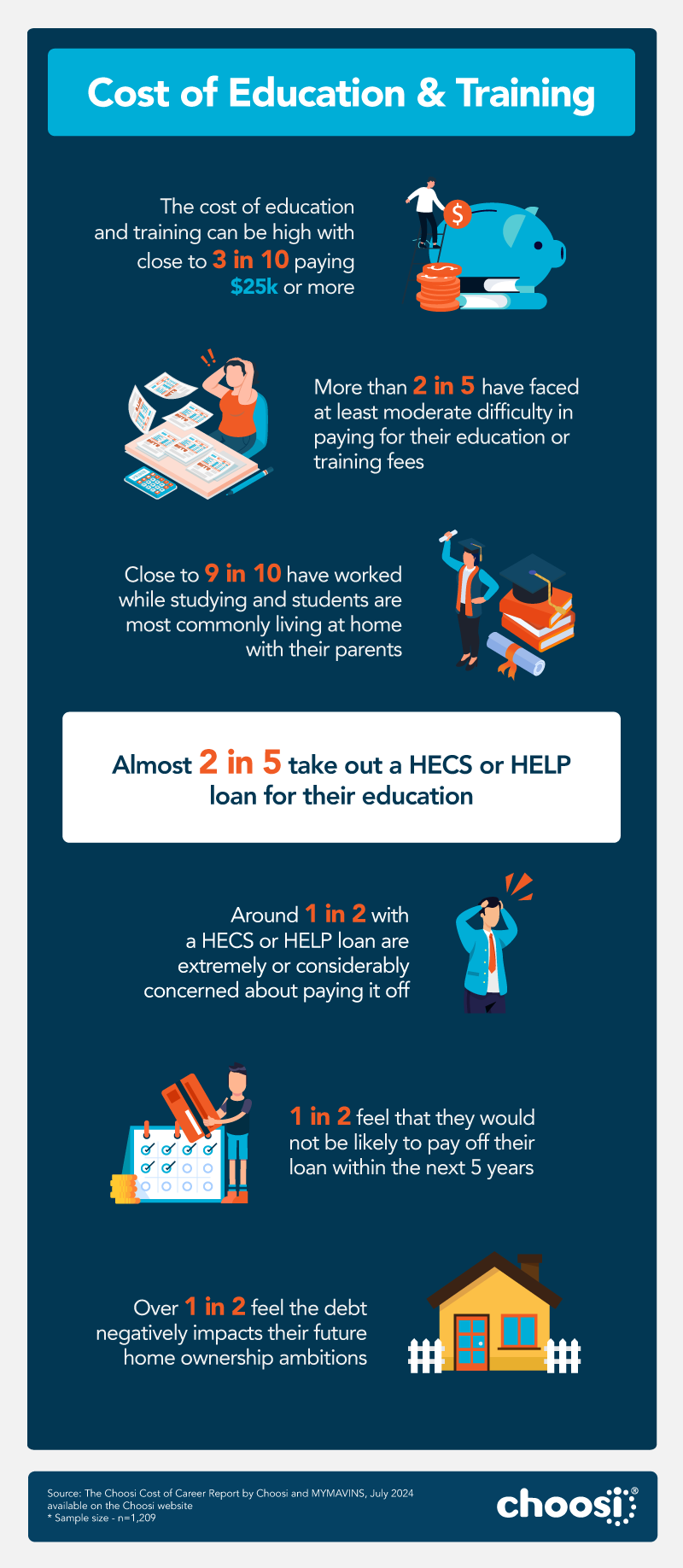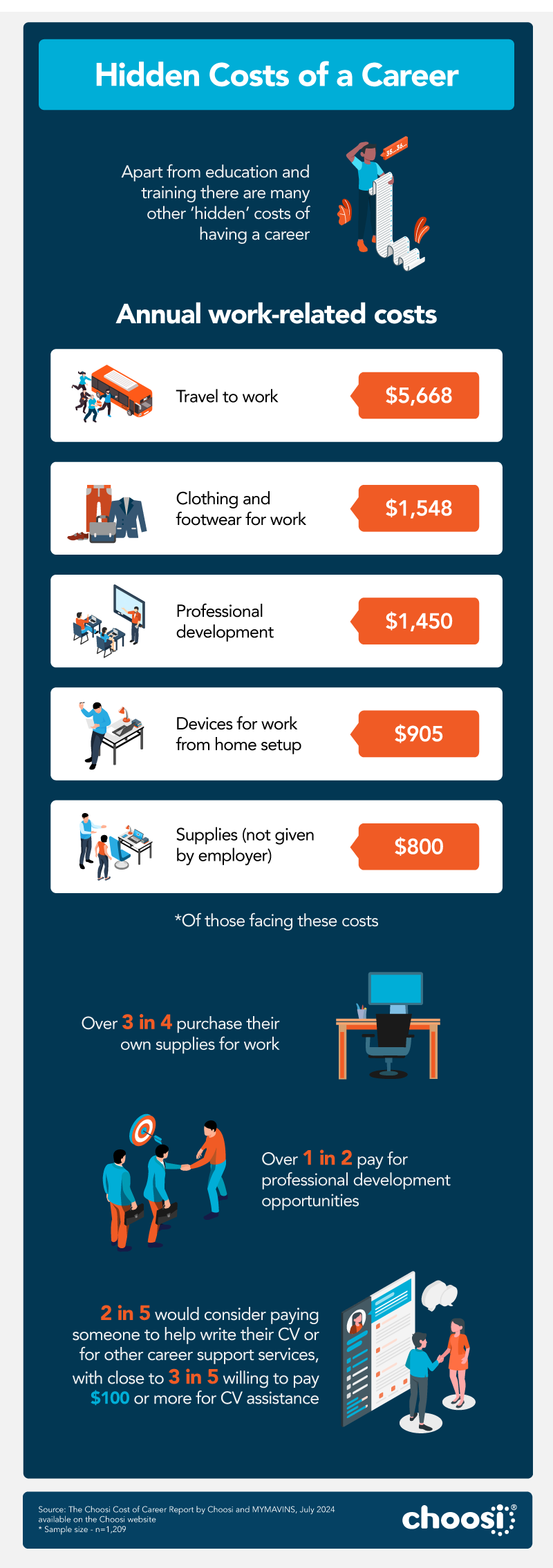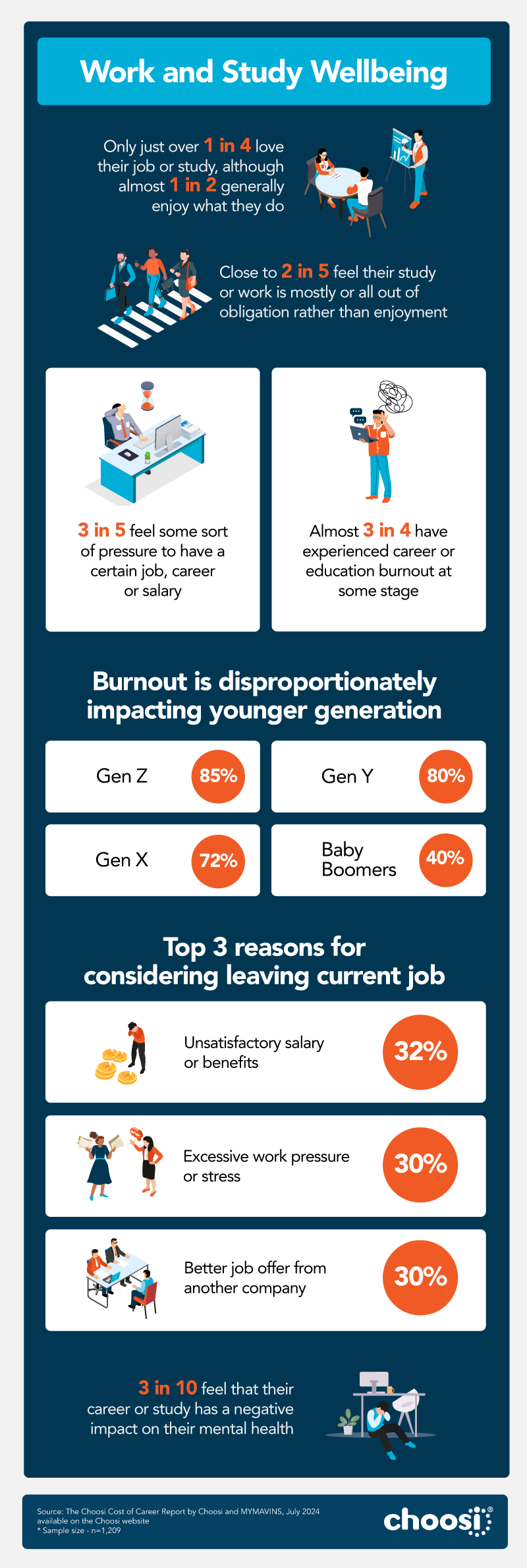The Choosi Cost of Career Report 2024
- Just over one in four Aussies love what they do for work or study
- 74% are feeling burnt out, with one in three reporting this before even entering the workplace
- Three in ten have misrepresented information on their CV
By the time many of us finish high school, we can’t wait to have a ‘real job’ and start our lives. However, in 2024 it appears many Aussies are being surprised by the financial and emotional costs involved with taking on further study and entering the workforce, as the Choosi Cost of Career Report 2024 reveals.
An overwhelming amount of us (74%) admit to feeling burnt out from study or our career, with just over a quarter (27%) of young Aussies feeling as though they love their job or what they are studying at university or TAFE.
As financial pressures continue to plague the nation, what does the future of the workforce look like? Will the next generation be able to afford further education, or will they need to sacrifice their dream career for a job that helps them pay the bills?
The Choosi Cost of Career Report 2024 forms part of the Choosi Research Series. In its latest instalment, this study explores the experience of Aussies as they move from study and training into their careers, and the general sentiment towards careers in 2024.
The qualification quandary
Tertiary education fees in Australia
It’s no surprise that pursuing tertiary education and training comes with a price tag – whether you’re looking at a TAFE course, a university degree or alternative training, it will set you back financially.
The one in four (25%) of us currently studying at university are looking at an average spend of $27,010 to secure our degree – the same price as an entry level Hyundai i30 or the deposit on a home worth $500,000.
If you’re shocked by that cost, you’re not the only one. Almost half (47%) of students that have taken out a HECS or HELP loan are expressing considerable concern about being able to repay it.
The report found that the cost of HECS of HELP debt has left more than one in two (56%) feeling as though it will negatively impact their home ownership prospects. Leading over a quarter (29%) to cut back on other ‘rites of passage’ like travel – farewell European summer and Contiki trips!
It’s no surprise considering 81% of Gen Z have reported facing at least some struggle in paying for their education or training fees, compared to just 42% of Baby Boomers. However, Gen Z were also more likely to have their tuition covered by parents (83%) than the generations before them.
Whilst university leads the pack on price, those wanting to complete an apprenticeship are looking at an average investment of $7,897, and $5,601 for TAFE qualifications.

Welcome to adulting!
The true cost to study in Australia
It’s not just the cost of getting your foot in the door that is setting Aussies back, the report has uncovered ‘hidden expenses’ associated with careers adding up to over $10,000 a year!
One of the top unexpected costs was the amount spent on travel expenses to work or study, with the average person spending $5,668 travelling to and from work each year. In other words, comparable to a return flight to London in the height of summer.
Other costs commonly faced include supplies ($800), work from home devices ($905), professional development ($1,450) and lastly clothes and additional travel ($1,548).

Generation burnout
Work burnout in 2024
First came the ‘Great Resignation’, then, the ‘Great Reskilling’, but it looks like 2024 is heralding in the year of the ‘Great Burnout’. Sadly, the research found that many workers (74%) are feeling the burn, with one in three (32%) feeling burnt out before even entering the workforce.
The research also found that Gen Z were three times more likely to feel burnt out after finishing high school than Gen Y (22% vs 7%), and four times more likely than Gen X to feel burnt out after a year in the workforce (28% vs 7%).
However, it looks like workers are mostly aligned on what they want from their workplace. When asked about leaving their job, the top two reasons considered included unsatisfactory salary or benefits (32%) and excessive work pressure or stress (30%). When it comes to changing jobs, the sentiment was similar, with job satisfaction (49%) and working conditions/flexibility/work-life balance (39%) being the two most common considerations.
Three in five (60%) feel some sort of pressure to have a certain job, career or salary. The most common pressures come from family (23%) followed by self-imposed pressures (21%). Economic conditions also play a significant role, affecting one in five (20%). Social media (15%) and societal or cultural expectations (14%) are other notable factors contributing to career pressure.
When it comes to the impact on mental health, those surveyed are conflicted on whether their career and study has had a positive or negative impact, with three in ten (30%) respectively. Most commonly, we’re struggling with a lack of work-life balance (28%) and neglecting personal wellbeing (24%).

A professional fib
How far does your resume go?
It’s common practice that you want to put your best foot forward when interviewing for a new job – updating your resume, preparing for the questions, and looking the part. However, the research found that some of us might be taking it a step too far, with three in ten (31%) admitting to having misrepresented information on their CV, with the most common fabrications including employment dates (13%), skill levels (12%), and false work experience (10%).
When it comes down to who is most likely to misrepresent the information on their resume, the research showed that women were more likely than men to be truthful (73% compared to 65%, respectively), with men appearing to lie about work experience and inflated qualifications more than their female counterparts.
In terms of the generational divide, Gen Z emerged as the least likely to be honest (55%) compared to Gen Y (66%), Gen X (81%) and Baby Boomers (86%). Interestingly, Gen Z were almost twice as likely as the generation before them (Gen Y) to inflate their skill level (21% compared to 11%), qualifications (13% compared to 7%), and references and recommendation letters (12% compared to 6%).
While pursuing a career and further education comes with a price tag, it’s important to remember that everyone goes on their own path and no journey looks the same.
Career and Interview Coach Leah Lambart gives us her top tips to navigate our career path
How to find your ‘best fit’ career
The first step to finding your ideal career is to take the time to understand yourself. Identify career options that align with your strengths, interests, and values. Additionally, research the job market to understand the demand for these roles. Once you have a list of potential careers, the next step is to gain a true understanding of what the work actually involves.
Here’s a step-by-step guide:
- Self-assessment: Reflect on your strengths, interests, and values to determine what type of work will be fulfilling for you.
- Market research: Explore the job market to identify in-demand careers that match your profile.
- In-depth research: Investigate the day-to-day responsibilities, required skills, and work environments of your shortlisted careers.
- Experiment and validate: Find ways to test your career ideas. This could include internships, volunteer work, or informational interviews.
Many people skip the experimentation step and rush into careers that don’t meet their expectations. This often leads to unfulfilling work and mismatched work environments. By following these steps, you have a much higher chance of finding your ‘best fit’ role.
Managing the inner critic when returning to work
Losing confidence after a career break to raise a family or care for a relative is common, and the longer the break, the greater the impact on your self-assurance. Returning to work is a significant life change, often triggering self-doubt. Thoughts like “I don’t have any skills” or “No one will want me after being out of work for so long” can arise, especially when stepping out of your comfort zone. Here are some tips to manage and overcome these negative thoughts:
- Expect the inner critic: Understand that self-doubt is normal during major life changes. Being aware of this inner voice allows you to address it proactively.
- Acknowledge and document negative thoughts: When negative messages surface, acknowledge them and write them down.
- Counter negative messages: For each negative thought, write down arguments to the contrary. For instance, if you think “You have no skills to offer,” make a list of your skills from previous roles and activities outside of work.
- Seek support: Ask a friend or colleague to help identify your skills and strengths. Often others see our abilities more clearly than we do ourselves.
By expecting and managing your inner critic, you can rebuild your confidence and successfully re-enter the workforce.
Balancing work and family
Returning to work after parental leave can be one of the most challenging times in your career. Balancing the demands of a new routine with the pressures from home, such as childcare pick-up deadlines or children getting sick, can feel overwhelming. This period can be particularly tough for parents, who often experience guilt about not being the perfect parent, employee, or colleague. Here are some essential tips to help you navigate this transition:
- Develop a routine: Establish a consistent schedule from the start to help manage your time effectively.
- Set boundaries: Clearly define your work and home boundaries early on to prevent burnout.
- Prioritise wellbeing: Make your health and wellbeing a priority to maintain balance and resilience.
- Ask for help: Don’t hesitate to seek support from family, friends, or colleagues when needed.
By implementing these strategies, you can ease the transition and create a more manageable and fulfilling balance between work and home life.
How to future proof your career
Future-proofing your career means preparing for unexpected career bumps such as a redundancy or job loss. It’s like an insurance policy against unforeseen disruptions like company takeovers, technological changes, or simply falling out of love with your work. The pandemic highlighted the need for such preparation, leaving many employees unprepared for sudden job losses.
Industries most in need of career cushioning are those vulnerable to technological advances and automation with roles at risk of being replaced by AI. Even employees in secure industries might feel the need to future proof their career if they sense their current path isn’t sustainable long-term.
If you want to future-proof your career, here are my top 5 tips:
- Nurture your network: You want it there to catch you if you fall.
- Work on your people skills: AI cannot replace people skills so if you are a technical person, work on developing ‘non-technical skills’.
- Stay relevant: Pay attention to what is happening in your industry.
- Commit to professional development: Keep learning and stay-up-to date.
- Build a strong online presence: LinkedIn allows you to build a brand and nurture your network – it is non-negotiable when it comes to career cushioning.
By implementing these strategies, you can cushion your career against uncertainties and stay prepared for the future.
5 Aug 2024
